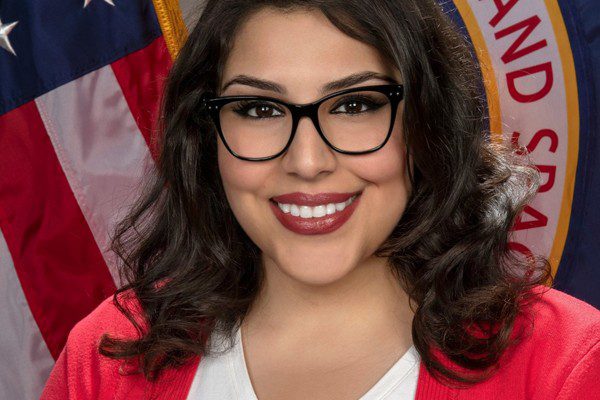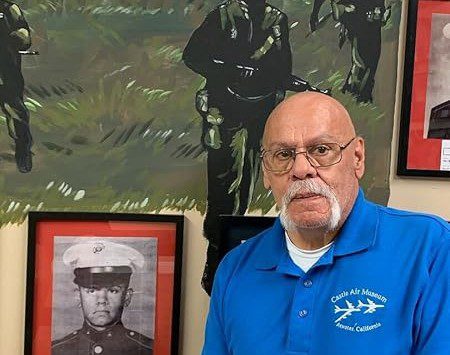Shideh Naderi has experienced much success since coming to the United States from Iran at 18 to study electrical engineering.
While still a junior in college, she applied for NASA’s Pathways Internship and landed a full time NASA job upon graduation. Since then, she has received $2.5 million to design and test a solution that solves a space mission problem, worked as an electronics/software engineer, was a deputy project manager on the Global Hawk/SkyRange project, and is now the flight test coordinator for the Convergent Aeronautics Solutions and Weather Tolerant Operations (CAS-WTO) program at Armstrong Flight Research Center at Edwards, Calif.
Oh, and next she’d like to become an astronaut.
“My ultimate career goal is to be an astronaut. I like to call it a goal, not a dream, because you wake up from dreams. But goals are attainable,” said Naderi.
She admits it’s a steep climb.
The first requirement is technical and academic excellence, then physical fitness, and finally personal traits and personality, according to Naderi. She says she’s working on the first two requirements now.
“I think they put out an application every few years and it is extensive ó you need recommendation letters, fill out a bunch of paperwork, but then there’s tiers, and they want people who have done extraordinary things.”
“If I’m just checking boxes, if I’m saying, oh I have a private pilot license, or I have a scuba diving license, or if I’m running marathons just to be an astronaut, they don’t want that. They want you to do those things for yourself, for your own enjoyment and for your own challenges. That’s something that they look for. So, when they look at all these applicants, I think they can tell who’s actually doing it for themselves, and who’s not.”
After the applications have been reviewed, cuts are made, and those left “go through testing and training and then the group gets reduced and reduced and reduced until they final have a class of 10 or 12 astronauts. So, it’s a very extensive process,” Naderi said.
“A lot of people maybe make it to the first or second round, but they can never make it to the final round. You have to be very exceptional to be an astronaut.”
The internship with NASA came after Naderi sent a message to a woman who had said online she got picked for an internship with NASA
“I didn’t even know her. I said, ‘How was the interview with NASA? Was it hard? Do you have any recommendations?’ And she said a few things and ‘By the way, the Pathways Internship is open and they’re going close in like two days.’ I had my resume ready to go for SpaceX, and I had a letter of recommendation for something else ready to go. So, I applied that night to the job opening on USA Jobs. And then I also applied to other internships and NASA.”
Naderi got the call from NASA and started a few weeks later.
She became the lead investigator on a project to develop and test a magnetic coupler for cryogenic fluids, which could withstand dusty conditions on the moon and other planets. Her team picked this from a list of technological problems that hinder space exploration to develop an answer.
“If you’re a Pathways intern, you get to come back every summer automatically to continue your internship. That was like set in stone. I think I did a decent job, so I got hired on like two weeks after graduation.”
Her advice for success in engineering is to apply for internships, join clubs, and do practical experiments, even if you must design your own.
Also, students should join professional groups like the Institute of Electrical and Electronics Engineers, of which Naderi was the president of her college’s chapter.
“One club at college was Mechatronics and we were building an autonomous submarine that would do underwater tests fully autonomously. So that was a huge engineering challenge,” Naderi said.
In 2015 the San Diego State Mechatronics Club came first out of 38 international teams: world champions.
Practical experience like this on a resume makes it stand out from the rest.
“Having a degree for the job is like the literal minimum requirement, even if you have really good grades. People hiring look for those with experience, because in a real job situation you’re getting interaction with a lot of other people. You get to face technical and nontechnical problems that you have to solve, and that gives you the experience.”
“I think experience is more important than, for example, graduating a year or two early, so I highly recommend internships to everyone in their field.”
“Everyone knows you need math and physics, but the overall thing is that you need to know how to do problem solving, how to break the problem down, and kind of divide and conquer if you have issues.
“As a high schooler who wants to go into engineering, I would just take good AP classes, take college courses, be ahead of the game, and I would highly recommend that they apply to internships even as a as a high schooler, a lot of companies hire interns from high school, or they have programs specifically tailored for high schoolers or freshmen in college.”
Naderi said she wants to tell anyone afraid of going into a male dominated role that “you will have more allies than enemies. The majority of people are good, especially in the higher education levels, they are way more used to women being engineers, and they’re way more supportive. They don’t care if you’re a woman or not.”











